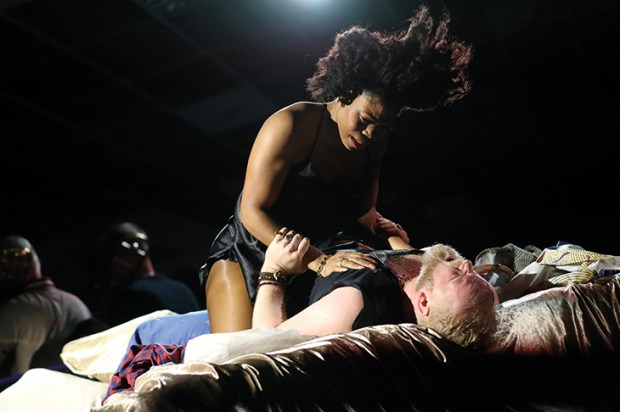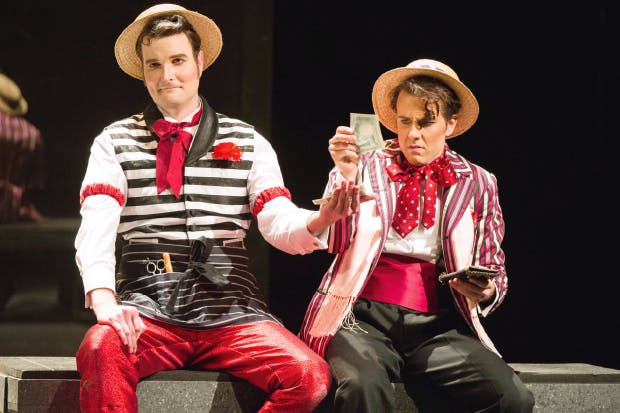‘Kiss me, Sergei! Kiss me hard! Kiss me until the icons fall and split!’ sings Katerina Ismailova, adulterous antiheroine of Lady Macbeth of Mtsensk. Stalin was not amused by Shostakovich’s bleak black comedy but our culture would be poorer without bored wives like Katerina. Perhaps all that Emma Bovary, Anna Karenina and Laura Jesson needed was a proper kiss — the sort that mutes the white noise of disappointment. But a kiss is never enough in these cautionary tales of bourgeois bed-hopping. One thing leads to another and before you know it you’re knocking back the arsenic, throwing yourself in front of a train or back home listening to the wireless with poor dear Fred, a man whose kisses were never that hot.
Where Emma, Anna and Laura hedge and idle, Katerina hurtles headlong into lust, disgrace and murder. She is, in both senses, a fast woman. Yet the striking thing about her in Dmitri Tcherniakov’s English National Opera production is her stillness — a stillness mirrored in conductor Mark Wigglesworth’s symphonic reading of a score blistered with frenzied dances. Moored in a thick, red womb of oriental carpets, Patricia Racette’s Katerina holds a glittering concentrate of fury in her dark eyes and her finely tempered voice. To either side, secretaries and factory hands go about their business, checking orders, answering phones. The forklift truck comes into play later, in one of the cartoonish gang-bangs by which ENO’s audience defines its tolerance. Less vivid an assault than that in Damiano Michieletto’s Guillaume Tell, the rape/not-rape of Rosie Aldridge’s blowsy Aksinya is also less transgressive than the moment when Katerina’s father-in-law Boris (Robert Hayward) places his heavy wandering hand on her childless belly.
Boris is the first to go in Katerina’s pheromone-fuelled killing spree, dispatched by poisoned mushrooms. Next up is Zinovy (Peter Hoare), her shrill, blank-firing husband. Neither is lamented until Adrian Thompson’s Shabby Peasant notices the whiff emanating from the cellar. Nor is greedy, sulky Sergei (John Daszak) much of a catch: a small-town Casanova whose cold, dull eyes are sharp enough to notice a woman who is ripe for the plucking. Now veiled and in thrall, Katerina abases herself like a Magdalene, kissing Sergei’s undeserving feet. Her desire burns brightly even in a distempered prison cell. Only when Sergei screws Sonyetka (Clare Presland) in front of her does she snap, killing the slut and herself, through the brutal agency of the prison guards.
There is much to admire: an orchestral performance charged with pity and pitilessness; choral singing of votive beauty in Act IV; boldly dislikable characterisations from Hayward, Hoare, Daszak, Aldridge and Presland; a lighting design (by Gleb Filshtinsky) that snaps and splinters at moments of crisis; a central performance of immaculate control and engagement from Racette; the score itself, with its wildness and its lassitude, its sullen brass, narcotic strings and hot tattoos of side drum and xylophone. Yet there are moments when Wigglesworth’s symphonic approach fails, and Thompson’s tittle-tattle dance sees pit and stage at two different tempi. Tcherniakov communicates a tragedy with no comedy and no context (the other prisoners in the gulag are invisible). By making Lady Macbeth all about the boredom of one woman, he has depoliticised a political opera.
Composed by Rolf Hind and directed by Frederic Wake-Walker, Lost in Thought was billed as a ‘mindfulness opera’ and contained what seemed like 15 minutes of music that sounded like chemically castrated early Birtwistle. Stripped of our bags, our phones, our shoes and writing material (this was press night) for four hours, we took our places on cushions, chairs and yoga mats, holding cards that read ‘Sit. Walk. Sit. Eat. Wash up. Sit. Rest. Waking up. Sit. Play. Walk. Chant. Sit. Breaking the silence.’ (D minus for grammar.)
The drama, we were told, would be in our minds. As mezzo-soprano Lore Lixenberg majestically intoned a meditation sequence in which we were encouraged to ‘return our distracted thoughts to our breath’ and become ‘super-aware’ of the febrile dings and pitchless breaths from the instrumentalists, I reflected on the biddability of the British audience. In 15 years of reviewing I have been locked into a cage, fed baklava, held a leash with a half-nude dancer at the end of it, been embraced, shoved, seduced, and got lost in a warehouse in the Isle of Dogs. I can take immersion. But washing up? Having held a grape between my teeth at Lixenberg’s command, walked about the room waving a whirly tube (wow), eaten a bowl of lentils then swished it in cold, dirty water, my distracted thoughts turned to norovirus. I thought I’d done well to smuggle in a notebook but one woman had a contraband cucumber. A cucumber! Never have I felt so carnivorous, so cynical, so decadent or so bored by something that might have aspired to the joy and wit of a work like John Cage’s Song Books had it been less pious. Had you handed me a poisonous mushroom, I’d have swallowed it whole.
When the reviewer stated that Lost in Thought contained ‘maybe 15 minutes’ of music, this was not an exact timing. It was merely what it seemed like. The text has been amended to make this clear.
Got something to add? Join the discussion and comment below.
Get 10 issues for just $10
Subscribe to The Spectator Australia today for the next 10 magazine issues, plus full online access, for just $10.













Comments
Don't miss out
Join the conversation with other Spectator Australia readers. Subscribe to leave a comment.
SUBSCRIBEAlready a subscriber? Log in